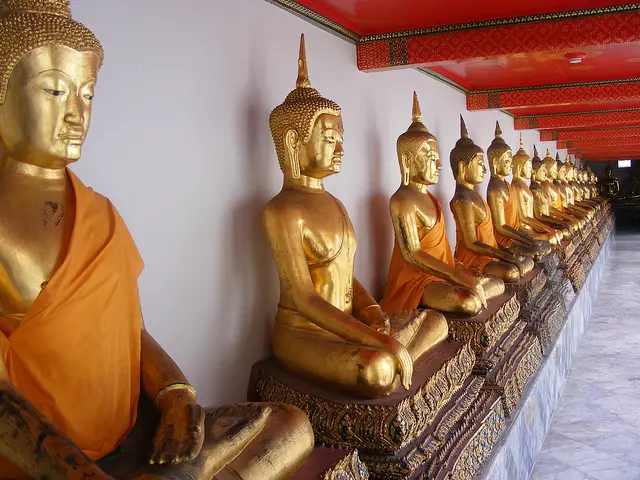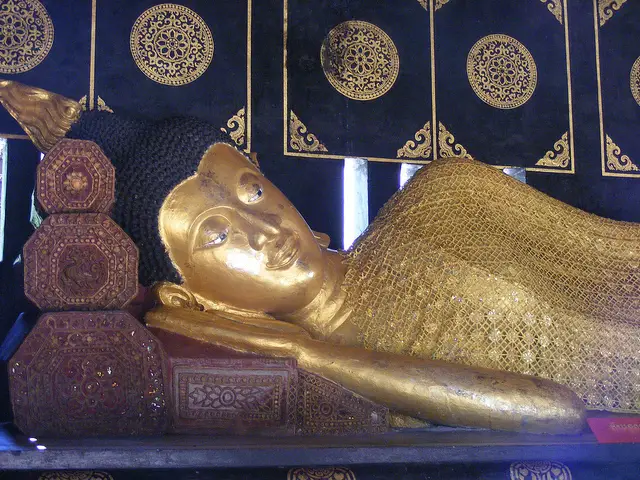After spending several months travelling round South East Asia a few years ago, I developed a fascination with Buddhism, and this has shaped my attitude to the world and my own life.
In this guest post for the Daily Mind I’d like to share some of the things that Buddhism has taught me.
Life isn’t meant to be easy
Before I discovered Buddhism I had a habit of grumbling and complaining about life. If I was having difficulties at work I’d find myself wishing that things could be easier. I often found myself envying other people who seemed to have an easier ride than me.
One of the things that Buddhism has taught me is that life just isn’t meant to be easy. In fact, the first thing the Buddha taught in his Four Noble Truths (the cornerstone of Buddhist teachings) is that “life means suffering.” In other words, human nature isn’t perfect and neither is the world we live in, which means that the very nature of human existence is painful.
During our lifetime, we will all go through physical suffering such as pain, sickness, injury and eventually death; and we will also endure psychological suffering like sadness, fear and depression. None of us are going to be able to escape that so, rather than fight it, you might as well accept it. With acceptance and realisation, I find comes a lot of peace.
Material things won’t make you happy
OK, this is hardly a new concept, but it’s something that really struck me during my travels around SE Asia and as I learnt more about Buddhism. Another of the Four Noble Truths is that the cause of suffering is attachment and craving. And once I really thought about it, it made a lot of sense to me.
Before quitting my job to go travelling I spent a lot of time and money hankering after the latest gadgets – a top of the range flatscreen TV, the latest smartphone, a shiny new laptop – you name it, I wanted it. But as soon as I got my newest toy the novelty would wear off and I’d find myself wanting something else – or envying other people’s things. I realised I’d got myself into a cycle of craving that simply wasn’t making me happy.
When I set off on my travels, all I had with me was a rucksack with a few clothes in, a notebook and pen and a few other essentials. No gadgets whatsoever. And after I got over the initial twitchiness, I soon found that I no longer missed my smartphone and laptop. In fact I felt sorry for other travellers who seemed obsessed with their phones – spending all their time texting or tweeting rather than living in the moment.
Nothing lasts forever
It’s a simple fact – nothing in this world lasts forever. And although it may not immediately sound like a positive notion, it actually is. Just like the happy times in life come to an end, so do the bad times, which is why we need to accept the impermanence of life.
I find this a particularly comforting thought when I’m going through a bad patch in life – just realising and accepting the impermanence of life reminds me that no matter how bad things may seem, they won’t last forever. This in turn brings a sense of positivity.
Buddhists take this same approach to death. Rather than fearing it and avoiding the subject as we tend to do in the West, they acknowledge and accept that death is inevitable because of the impermanence of life.
I found this to be particularly helpful in coming to terms with the death of my father. After he passed away I felt a combination of bitterness, regret, shock and denial. For a long time I simply couldn’t accept that he was no longer around. But the teachings of Buddhism have helped me realise that this is a part of life and to be accepted. It’s taken me a long time to get to that point, but it’s something I’m now at peace with.
Life is more enjoyable when you live in the moment
Before I discovered Buddhism I rarely lived in the moment. I’d either be dwelling on past mistakes, feeling wistful for days gone by or making plans for the future. My mind was always elsewhere, thinking, planning etc. Even when I first went travelling I found myself thinking ahead to the next country I was going on to, rather than enjoying the experience I was having at the time.
Buddhism has taught me the importance of mindfulness – existing in the present and being aware of your thoughts and actions in the present moment without any judgment.
Samadhi is the Buddhist practice of concentration and mental discipline in order to develop mastery over one’s mind. This is achieved through various contemplative and meditative practices. It’s not an easy thing to master, particularly in today’s busy world where we are surrounded by distractions, but it is a practice that brings about a huge sense of calm, peace and clarity. I think it’s also a really useful way of releasing attachments or cravings.
By learning to live in the present moment we are able to release any longing or wistfulness for the past, or worry or anticipation about the future. And perhaps this is the true way to reach enlightenment.
About the author: Simon has been following the ways of Buddhism for over five years. He loves to study Asian languages and has travelled extensively around SE Asia. Currently he is preparing for a trip to Thailand where he will learn Thai in Bangkok






